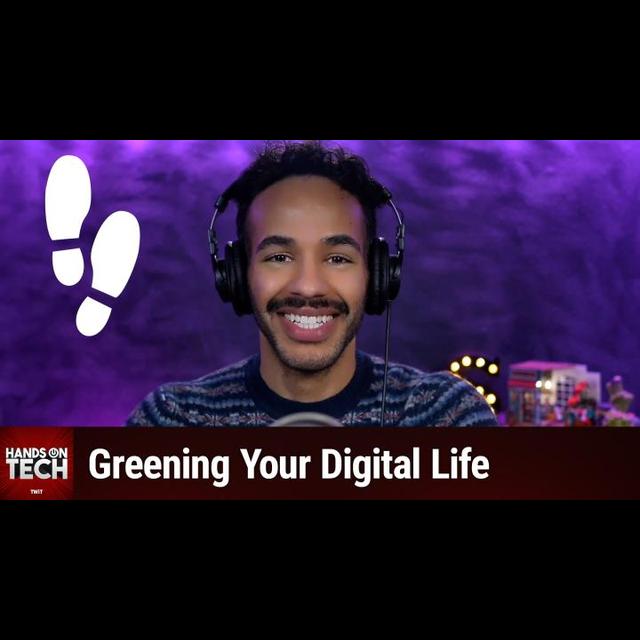Jun 4th 2025
AI-created, human-reviewed.
Ever wondered if that email signature reminding people to "think before printing" actually makes a difference? Or whether your daily tech habits are secretly contributing to climate change? On a recent episode of Hands-On Tech, host Mikah Sargent tackled these questions head-on, revealing some surprising truths about our digital carbon footprints.
The discussion began with a fascinating question from listener Steven, who recalled his days working in IT about a decade ago. Back then, environmental email signatures were everywhere, prompting Steven to jokingly change his own signature to say "please remove all attachments and content and recycle this email after use." What started as a bit of workplace humor led to a genuine question: does reusing emails actually save server space and reduce environmental impact?
Turns out, Steven was onto something. Mikah's research revealed that our seemingly innocent digital habits have a more significant environmental impact than most people realize.
The Real Numbers Behind Digital Emissions
Here's where things get eye-opening. According to research from Mike Berners-Lee's book "How Bad Are Bananas? The Carbon Footprint of Everything," the environmental cost of our digital communications varies dramatically:
A simple text-only email generates about 0.3 grams of CO2 emissionsAdd a large attachment (1 MB+), and that number jumps to nearly 50 gramsA lengthy email that takes 10 minutes to write but only seconds to read? That's 17 grams of CO2To put this in perspective, the average person's annual email usage generates between 3 to 40 kilograms of CO2 emissions – equivalent to driving 10 to 128 miles in a small gas car. Multiply that by 3.9 billion email users worldwide, and you're looking at a substantial environmental impact.
Video Calls: The Biggest Digital Culprit
While emails have their impact, video streaming and conferencing are the real energy hogs. One hour of HD streaming generates about 36 grams of CO2 emissions. But here's the kicker: you can slash your video conference carbon footprint by up to 96% simply by turning off your camera when it's not essential.
Switching from HD to standard definition can reduce emissions by about 80%. Mikah's advice? Default to audio-only meetings when faces aren't crucial – your planet (and your bandwidth) will thank you.
The Corporate Responsibility Reality Check
Before diving deeper into individual actions, Mikah made an important point that often gets overlooked in environmental discussions. While personal changes matter, the most significant environmental impacts come from large corporations and data centers. There's been a concerning shift toward placing responsibility primarily on individuals, asking us to sort our recycling perfectly while corporations continue practices with massive environmental footprints.
This doesn't mean individual actions are worthless, but it's crucial to maintain perspective about where the most significant changes need to happen.
Smart Choices for Devices and Storage
Your smartphone habits also play a role in your digital carbon footprint. The manufacturing process has the most significant environmental impact, so keeping your phone for five to seven years instead of upgrading every two and a half years can substantially reduce lifetime emissions.
Here's an interesting tidbit: Remember when dark mode became popular partly for its energy-saving benefits on OLED screens? Well, studies found that people using dark mode often compensated by cranking up their screen brightness, potentially using more energy than they would with light mode at normal brightness levels.
For cloud storage, Mikah recommends regular digital housekeeping. Those forgotten photo duplicates, stale backups, and old email attachments sit on always-on servers in data centers. Cleaning them up periodically can help, though the impact depends on whether other users fill that storage space.
The AI Question: A Growing Concern
With AI tools becoming ubiquitous, their environmental impact is increasingly relevant. A typical web search generates about 0.2 grams of CO2, but a generative AI prompt can be four to 10 times higher. Mikah suggests batching AI questions when possible and relying on simpler voice assistant queries for routine tasks.
This puts recent discussions about AI courtesy into perspective. While one person saying "thank you" to ChatGPT doesn't significantly impact emissions, millions of unnecessary pleasantries add up quickly.
Practical Steps You Can Take Today
Based on Mikah's research, here are some simple ways to reduce your digital carbon footprint:
Email Management:
Remove images from email signaturesLink to cloud files instead of attaching large documentsSet up auto-deletion for large or unread newslettersBe mindful of attachment sizesVideo Conferencing:
Turn off your camera when it's not essentialUse standard definition instead of HD when possibleDefault to audio-only meetings when appropriateDevice Usage:
Keep devices longer (aim for 5-7 years for phones)Perform regular software updates to maintain efficiencyUse appropriate screen brightness levelsConsider battery replacement instead of full device replacementDigital Housekeeping:
Regularly clean up cloud storageDelete duplicate photos and filesRemove old backups you no longer needChoose cloud providers committed to renewable energyAI and Search:
Batch AI questions when possibleUse traditional search for simple queriesAvoid unnecessary courtesy interactions with AI toolsThe Bottom Line
While individual actions might seem like drops in the ocean compared to corporate emissions, they're still worth taking – especially when they're simple and can save you money on energy bills. The key is maintaining perspective: push for systemic changes while making reasonable personal adjustments.
As Mikah emphasized, don't beat yourself up over every digital decision. The fact that you're thinking about these issues and making small changes is already meaningful progress.
Share: Copied! Hands-On Tech #218Jun 1 2025 - Tech Carbon Footprint
Greening Your Digital Life All Tech posts Contact Advertise CC License Privacy Policy Ad Choices TOS Store Twitter Facebook Instgram YouTube Yes, like every site on the Internet, this site uses cookies. So now you know. Learn more Hide Home Schedule Subscribe Club TWiT About Club TWiT FAQ Access Account Members-Only Podcasts Update Payment Method Connect to Discord TWiT Blog Recent Posts Advertise Sponsors Store People About What is TWiT.tv Tickets Developer Program and API Tip jar Partners Contact Us

